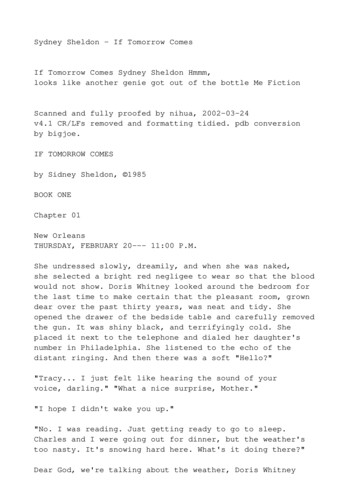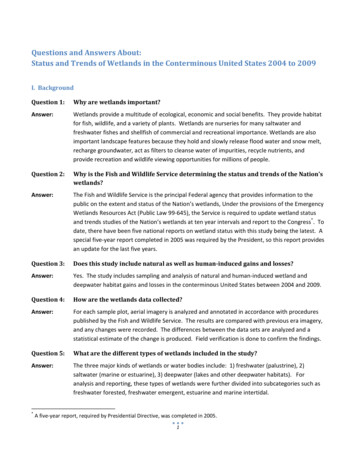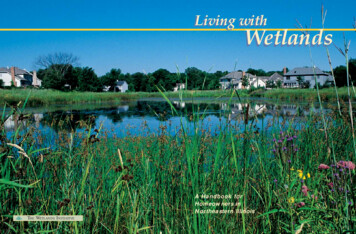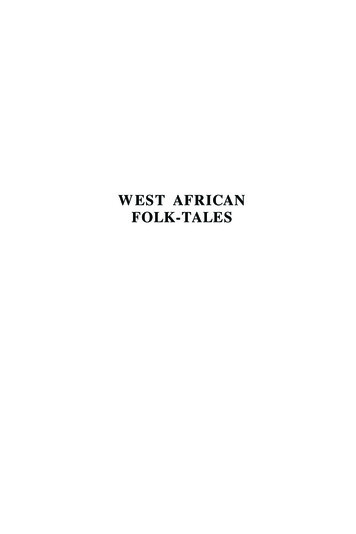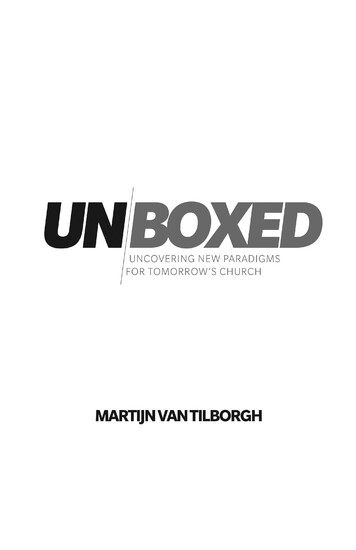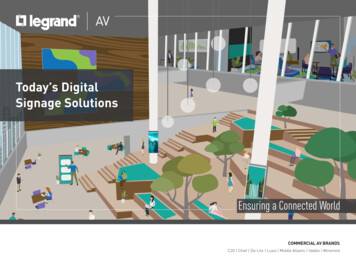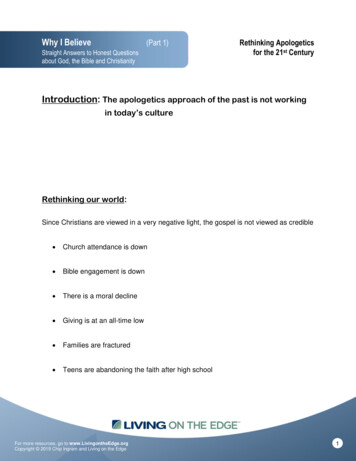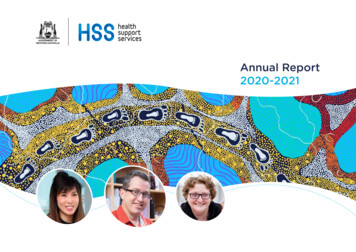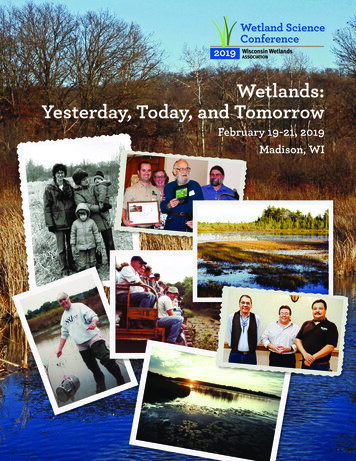
Transcription
2019Wetlands:Yesterday, Today, and TomorrowFebruary 19-21, 2019Madison, WI
About Wisconsin Wetlands Association50 YEARS214 N. Hamilton St., Suite 201Madison, WI 53703Phone: 608-250-9971wisconsinwetlands.orgEmail: info@wisconsinwetlands.orgDownload theConference AppAvailable on IOS and Androiddevices. If you have questions, stopby the registration desk.1. F rom your mobile device AppStore, search for Events@TNC2. Download Events@TNC and openthe app on your phone3. Click on Find Guides at the bottomof the screen.4. Enter the passphrase 2019wetlandsand your guide will downloadautomatically!Make it SocialLike us on Facebook or follow us onTwitter @WIWetlandsAssoc.Share your conference experienceusing #WWAconference!.Photo credits: Monika Blazs, Gerald Emmerich Jr.,Eric Epstein, Bill Pielsticker, Marita ValenciaWisconsin Wetlands Association is dedicated to the protection,restoration, and enjoyment of wetlands and associatedecosystems through science-based programs, education, andadvocacy. We envision a state where wetlands are healthy andplentiful and support ecological and societal needs, and wherecitizens care for, appreciate, and interact with these naturalresources. We are a non-profit, non-partisan, member-supportedconservation organization.If you are not yet a member of Wisconsin Wetlands Association,we encourage you to show your support for wetlands and for ourwetland conservation programs by becoming a member today!Learn more and join online at wisconsinwetlands.orgWorld Wetlands DayFebruary 2nd is World Wetlands Day, the annual worldwidecelebration of wetlands that commemorates the signing of theRamsar Convention on Wetlands on February 2, 1971, in theIranian city of Ramsar. On World Wetlands Day,government agencies, non-governmentalorganizations, and groups of citizens aroundthe world take action to raise public awarenessof wetland values. WWA’s Wetland ScienceConference is held in celebration of WorldWetlands Day 2019. Learn more about WorldWetlands Day at ramsar.org.In 2012, Wisconsin Wetlands Association became the first U.S.based entity to ever win the Wetlands Conservation Award forEducation from the Ramsar Convention. We were honored for ourwork to promote and increase the number of designated RamsarWetlands of International Importance in Wisconsin and the UnitedStates as well as for our outreach and education programs thatpromote the ideals of the Ramsar Convention. We continue towork with Wisconsin wetland professionals and enthusiasts tonominate worthy Wisconsin wetlands for Ramsar designation,including the Kakagon and Bad River Sloughs (designated in2012), the Door Peninsula Coastal Wetlands (designated in 2014)and Chiwaukee Illinois Beach Lake Plain (designated in 2015), andthe Lower Wisconsin River (under review).
Table of ContentsNote: You can view abstracts and biographies in our conference app, at the registration desk,or by downloading them in pdf format at conference.wisconsinwetlands.org/abstracts.Welcome and Theme Description . . . . . . . . . . . . . . . . . . . . . . . . . . . . . . . . . . . . . . . . . . . . . . . . . . . . . . . . . 2Program HighlightsKeynote Address: Jeanne Christie . . . . . . . . . . . . . . . . . . . . . . . . . . . . . . . . . . . . . . . . . . . . . . . . . . . . . . . . . 3Plenary Presentation: Katie Beilfuss . . . . . . . . . . . . . . . . . . . . . . . . . . . . . . . . . . . . . . . . . . . . . . . . . . . . . . . 3Banquet Presentation: Dr. Cassandra Newby-Alexander . . . . . . . . . . . . . . . . . . . . . . . . . . . . . . . . . . . 4Workshop: Don’t Talk Like A Scientist . . . . . . . . . . . . . . . . . . . . . . . . . . . . . . . . . . . . . . . . . . . . . . . . . . . . . 5Workshop: Conservation Dogs: What’s the Sniff All About? . . . . . . . . . . . . . . . . . . . . . . . . . . . . . . . . 5Workshop: Biology and Identification of Aquatic Macrophytes . . . . . . . . . . . . . . . . . . . . . . . . . . . . . 5Workshop: Wetland Soils: An Introduction or Refresher Short Course . . . . . . . . . . . . . . . . . . . . . . 5Field Trip: The Devastating Flood of Pheasant Branch: A Tale of Two Ecosystems . . . . . . . . . . . . 5Field Trip: A Bird Haven In Winter: Goose Pond Sanctuary . . . . . . . . . . . . . . . . . . . . . . . . . . . . . . . . . . 5Field Trip: Explore Natural History Collections at UW-Madison . . . . . . . . . . . . . . . . . . . . . . . . . . . . . 5Program Schedule-at-a-Glance . . . . . . . . . . . . . . . . . . . . . . . . . . . . . . . . . . . . . . . . . . . . . . . . . . . . . . . . . 6-7Special Session: Career Development & Continuing Education in Wetland Science . . . . . . . . . 8Working Group: Tribal Wetland Programs . . . . . . . . . . . . . . . . . . . . . . . . . . . . . . . . . . . . . . . . . . . . . . . . . 8Special Session: Legislative/Policy Update . . . . . . . . . . . . . . . . . . . . . . . . . . . . . . . . . . . . . . . . . . . . . . . . 8Special Session: Fire and Management in Wetland Ecosystems: Identifying Prioritiesfor Information Sharing and Research . . . . . . . . . . . . . . . . . . . . . . . . . . . . . . . . . . . . . . . . . . . . . . . . . . . . 9Special Session: Wetlands and Water Quality in Wisconsin: Where Have We Been,and Where Do We Go from Here? . . . . . . . . . . . . . . . . . . . . . . . . . . . . . . . . . . . . . . . . . . . . . . . . . . . . . . . . . 9Working Group: Wetland Practitioners . . . . . . . . . . . . . . . . . . . . . . . . . . . . . . . . . . . . . . . . . . . . . . . . . . . . 9Poster Session . . . . . . . . . . . . . . . . . . . . . . . . . . . . . . . . . . . . . . . . . . . . . . . . . . . . . . . . . . . . . . . . . . . . . . . . . . . 10AcknowledgementsModerators . . . . . . . . . . . . . . . . . . . . . . . . . . . . . . . . . . . . . . . . . . . . . . . . . . . . . . . . . . . . . . . . . . . . . . . . . . . . . 11Field Trip Leaders . . . . . . . . . . . . . . . . . . . . . . . . . . . . . . . . . . . . . . . . . . . . . . . . . . . . . . . . . . . . . . . . . . . . . . . . 11Student Scholarship Program Sponsors and Recipients . . . . . . . . . . . . . . . . . . . . . . . . . . . . . . . . . . . . 11Student Presentation Competition . . . . . . . . . . . . . . . . . . . . . . . . . . . . . . . . . . . . . . . . . . . . . . . . . . . . . . . 11Volunteers . . . . . . . . . . . . . . . . . . . . . . . . . . . . . . . . . . . . . . . . . . . . . . . . . . . . . . . . . . . . . . . . . . . . . . . . . . . . . . . 11Conference Facility Map . . . . . . . . . . . . . . . . . . . . . . . . . . . . . . . . . . . . . . . . . . . . . . . . . . . . . . . . . . . . . . . . . . 12Sponsors and Exhibitors . . . . . . . . . . . . . . . . . . . . . . . . . . . . . . . . . . . . . . . . . . . . . . . . . . . inside back coverWETLANDS: YESTERDAY, TODAY, AND TOMORROW 1
Welcome toWetlands: Yesterday, Today, and TomorrowWisconsin Wetlands Association’s 24th Annual Wetland Science ConferenceConference Advisory PanelTom Bernthal WDNR (retired)Dan Collins Landscapes of PlaceGail Epping Overholt UW-Madison ArboretumAaron Feggestad StantecRebecca Graser USACETracy Hames Wisconsin Wetlands AssociationTod Highsmith WWA Board of DirectorsKelly Kearns WDNRLauren Leckwee WCMPNick Miller The Nature ConservancyTravis Olson UW-ExtensionRandy Poelma Ho-Chunk NationDan Salas CardnoSusan Schumacher We EnergiesPat Trochlell WDNR (retired)Dreux Watermolen WDNRWWA staff supporting these advisors: Katie Beilfuss andEmily Buck. Logistical support provided by Fiorella Neira ofNeira Event Group.On a summer evening 50 years ago, a handful of peoplegathered on a front lawn in southern Wisconsin with avision to create an independent, science-based voice forWisconsin’s wetlands at a time when no one else seemedto care. Out of this initial meeting grew the WisconsinWetlands Association (WWA). In 2019, WWA celebrates itsGolden Anniversary: 50 years of speaking up for wetlandsin Wisconsin. The 2019 conference will kick off celebrationsof this momentous milestone.The 2019 conference theme—Wetlands: Yesterday, Today,and Tomorrow—reflects this anniversary and providesan opportunity for us to look back broadly as a wetlandcommunity. Where have we come from, where are wetoday, and where do we need to go in the next fifty years?How have our work and our issues changed, what havewe learned, and what have we accomplished? Where dowe need to take our work in the future to achieve whatwe need for wildlife, for water, and for communities? Theconference will address these questions and more.We thank you for your memories of wetlands past, yourwork today, and your ideas for tomorrow. Wisconsin’swetlands—and people—benefit from your efforts.Visit the Superior Ballroom to view memorabilia and explorea timeline of WWA milestones from the past 50 years.PATRICK KIRCHNERMONIKA BLAZS2 WETLANDS: YESTERDAY, TODAY, AND TOMORROW
Program Highlights: Keynote SpeakersPlenary PresentationWednesday, February 20, 9:20–10:10 amLocation: Michigan BallroomSponsored by Stantec.Thursday, February 21, 8:40–9:30 amLocation: Michigan BallroomSponsored by Cardno.Yesterday, Today, and Tomorrow in U.S.Wetland Policy: How Did We Get Here,Where Are We Headed, and Is It Enough?The Power of Community: AdvancingWetland Conservation in WisconsinJeanne ChristieChristie Consulting Services, LLCThe history of U.S wetland policy hasdeep roots going back to the SwampLand Act of 1850. Over the years,the Clean Water Act, the “no net loss”goal, and other federal and state actions created newprotections for wetlands. At the same time, the ‘science’ ofwetland restoration was broadening far beyond waterfowlhabitat, and national policy reflected the optimisticoutlook that wetlands could successfully be restored.Despite the many advances in wetland restoration science,restoration has not yet occurred on a scale large enough tobegin to address earlier losses.So, what’s next? Christie will discuss how we came tobe where we are today with respect to wetland policyat federal and state levels. She will share how pastexperiences may provide important insights on howto redirect and re-energize support and resources forwetlands in Wisconsin and around the country. And shewill discuss how new ideas and science can inform andbuild on decades of pursuing the dream of halting wetlandlosses and restoring healthy, productive wetlands.ABOUT THE SPEAKER Jeanne Christie is Principal atChristie Consulting Services, LCC. She was ExecutiveDirector of the Association of State Wetland Managers andhas a breadth of experience from working with the USDANRCS, the USEPA, and WDNR. She has bachelor’s degreesin political science and environmental science from theUniversity of Maine at Presque Isle. Jeanne was the 2007winner of the National Wetlands Award for Education andOutreach.MONIKA BLAZSKeynote AddressKatie BeilfussWisconsin Wetlands AssociationEvery year, Wetland Science Conferenceparticipants remark on how importantthis annual gathering is for networkingand fostering a sense of our sharedwork as a community. But what does it mean to be acommunity? Who are “we,” and what is the role each of usplays in this community’s wetland conservation work?As WWA celebrates our Golden Anniversary, we want toset the stage for the next 50 years of advancing wetlandscience and practices. In this interactive session, Beilfusswill revisit wetland conservation themes and exploreopportunities to strengthen our collective impact.Whether you work as a consultant or a contractor, studywetlands or restore them, help implement wetland lawsor help others understand them, we hope you’ll join us forthis important exploration of how we can work togethermore intentionally and more effectively to advancewetland conservation in Wisconsin.ABOUT THE SPEAKER Katie Beilfuss directs WWA’scommunications and has been the lead staff for the annualWetland Science Conference for ten years. She managesWWA’s private landowner outreach program and Ramsarinitiative. Katie has a bachelor’s degree in environmentalstudies from Oberlin College and a master’s degree in landresources from UW-Madison’s Gaylord Nelson Institute forEnvironmental Studies. She has more than twenty years ofnonprofit and environmental experience.WETLANDS: YESTERDAY, TODAY, AND TOMORROW 3
Program Highlights: Banquet PresentationWednesday, February 206:30–9:30 pmLocation: Michigan BallroomSponsored by We Energies.The Dismal SwampRevealed:A Pathway to FreedomDr. CassandraNewby-Alexander,Norfolk StateUniversityThirty miles westof the AtlanticOcean is an area that William Byrd IIIcalled a “dreadful swamp” because ofits size and environmental challenges.This area, lying between the JamesRiver in southeastern Virginia nearNorfolk and the Albemarle Sound nearEdenton, North Carolina, is now calledthe Dismal Swamp. The Swamp wasa place where many enslaved AfricanAmericans from the surroundingcounties in Virginia and North Carolinamade their escape. Most did notremain in the swamp, instead using itas a route to the Norfolk harbor fromwhich those seeking freedom securedpassage aboard steamers headedNorth.African Americans who lived incommunities inside the swamp formany years.Once a marshland that spanned onemillion acres, the Dismal Swamp isnow a 110,000-acre wildlife refuge.The refuge also commemorates its roleas an escape route and safe place forfugitive slaves. Today, archaeologicalactivity is documenting the maroons,ABOUT THE SPEAKER CassandraNewby-Alexander, Ph.D., is the Deanof the College of Liberal Arts, Professorof History, and Director of the JosephJenkins Roberts Center for AfricanDiaspora Studies at Norfolk StateUniversity. Her publications focus onVirginia’s African American historyand the importance of the waterwaysin the Underground Railroad. Shehas also has appeared in a numberof documentaries and episodes onC-SPAN and serves on numerousboards.As the U.S. marks the 400thanniversary of the arrival of the firstblack slaves in America, NewbyAlexander will share the stories ofthe Dismal Swamp and the peoplewho passed through and lived there,exploring how this wetland providedcritical refuge along the journey tofreedom on the Underground Railroad.Note: The Banquet is a ticketed eventopen to conference participants and thegeneral public who purchased tickets inadvance. If you did not purchase a ticket,please see the conference registrationdesk for information about ticketavailability.RÉGIS FRANÇOIS GIGNOUX4 WETLANDS: YESTERDAY, TODAY, AND TOMORROW
Program Highlights: WorkshopsProgram Highlights: Field TripsPre-registration was required for workshopsand capacity is limited. If you did not sign up for aworkshop when you registered for the conference,please see the conference registration desk to find out ifany workshops have space to accommodate you. If youare signed up for a workshop but can no longer attend,please let the registration desk know.Thursday, February 211:30–4:30 pmDon’t Talk Like a ScientistWednesday, February 201:30–3:10 pmLocation: Geneva BallroomInstructor: Cindy Crosby, author and communicationprofessionalConservation Dogs: What’s the Sniff All About?Wednesday, February 203:40–5:00 pmLocation: Geneva BallroomInstructors: Cory Gritzmacher, Mequon Nature Preserve,and Laura Holder, Midwest Conservation Dogs, Inc.Biology and Identification of Aquatic MacrophytesThursday, February 219:30 am–12:00 pmLocation: Geneva BallroomInstructor: Paul Skawinski, UW-Stevens PointWetland Soils:An Introduction or Refresher Short CourseThursday, February 211:30 pm–4:30 pmLocation: Geneva BallroomInstructors: Pat Trochlell, retired wetland ecologist, andNeil Molstad, former WDNRPre-registration was required for field trips andcapacity is limited. If you did not sign up for a field tripwhen you registered for the conference, please see theconference registration desk to find out if any field tripshave space to accommodate you. If you are signed upfor a field trip but can no longer attend, please let theregistration desk know.Field trips will run in almost any weather (with theexception of hazardous conditions). Please dress warmlyand wear sturdy boots. All field trips will depart from theMadison Marriot West Conference Center Entrance at1:30 pm; please arrive by 1:20 to get checked-in.The Devastating Flood of Pheasant Branch:A Tale of Two EcosystemsField trip leaders: Tom Bernthal, retired WDNR, and TomGarn, retired USGSSponsored by Midwest Natural Resources.A Bird Haven in Winter: Goose Pond SanctuaryField trip leaders: Mark Martin, Sue Foote-Martin, andGraham Steinhauer, Madison Audubon-Goose PondSanctuarySponsored by Wisconsin Coastal Management Program.Explore Natural History Collections at UW-MadisonField Trip Leaders: Laura Monahan,UW Zoological Museum, and Mary Ann Feist and KenCameron, Wisconsin State HerbariumThis is primarily an indoor field trip, but participants willhave a 10-minute walk between buildings on the UWMadison Campus.MEQUON NATURE PRESERVESponsored by Midwest Groundcovers.WETLANDS: YESTERDAY, TODAY, AND TOMORROW 5
WEDNESDAY, February 20, 9:00 am - 9:30 pm9:00 - 10:109:009:20Plenary Session (Michigan)Sponsored by StantecWelcome & Opening commentsConference Keynote: Yesterday, Today, and Tomorrow in U.S. Wetland Policy: How Did We Get Here, Where are We Headed, and Is It Enough?Jeanne Christie, Christie Consulting Services, LLC10:10 - 10:4010:40 - 12:00Break (Superior)Concurrent SessionsSponsored by MerjentLocation: WisconsinWatershed ApproachesModerator: Kyle MagyeraLocation: MendotaInvasive Species: The Big PictureModerator: Nicole StaskowskiSpecial Sessions10:40Wetland restoration and protection decision support:Lower Fox/Green Bay wetlands & water quality GrimmWetland first aid toolbox: Strategies to combat invasivespecies in challenging wetlands Angerhofer11:00Wetlands for tomorrow: Maintaining resilient,connected, and functional landscapes as climatechanges MillerLessons learned in the field: Short-term observations onmanaging invasive grasses in wetlands using herbicides Loftus11:20The Floodplain Explorer: A decision tool to prioritizefloodplain restoration in the Mississippi River Basin LentEvaluating the success of restoration and managementtechniques for prairie fen sites in Michigan McGowanStinski11:40The role of wetlands in a watershed approach torestoring the Little Plover River in Wisconsin GaffieldInvasive species early detection surveys andmanagement recommendations in coastal wetlands ofLake Superior Bates12:00 - 1:301:30 - 3:10Lunch (provided – Michigan)Concurrent SessionsLocation: MendotaInvasive Species: Species-Specific ControlModerator: Kelly KearnsDevelopment of a key to wetland plant communities O’ConnorA cryptic invasion: Lessons learned attempting to controlsouthern cattail (Typha domingensis) in a Midwestwetland system Thompson1:50Wetland floristic quality assessment benchmarks for WIDriftless Area & Southeastern WI Till Plains Ecoregions MartiMapping the invasive plant reed sweet mannagrass(Glyceria maxima) using aerial imagery, machine learning,and field reconnaissance Granberg2:10Assessing the effectiveness of vegetative restorationtechniques using wetland floristic quality StrojnyRetrofitting three wastewater treatment facilities toeradicate non-native Phragmites in the ChequamegonBay region Abel2:30Applying FQA methodology to assess restored wetlands:Results from 32 restoration projects GibsonResults of landscape-scale exotic Phragmites treatmentsin Wisconsin Kron2:50The new wetland mapping initiative SmithPhragmites Adaptive Management Framework:Managing Phragmites with science on your side Stanton3:10 - 3:403:40 - 5:00Break (Superior)Concurrent SessionsSponsored by ForestCounty PotawatomiFoundationLegislative/Policy UpdateLocation: GenevaFacilitated by WWAWorkshopLocation: GenevaDon’t Talk Like A Scientist**Pre-registration required**Instructor: Cindy CrosbySponsored by NES Ecological ServicesLocation: WisconsinWetland Flora and Plant Communities:Sites and SpeciesModerator: Dan CollinsLocation: MendotaWetlands and PeopleModerator: Alison Peña3:40Wild rice restoration on the Green Bay west shore GlenzinskiA story is worth a thousand facts: Communicatingwetlands issues to future conservationists Vosen*4:00Sod in motion: Moving wet prairie sod to preserve onehalf acre of high-quality prairie remnant PooleWetland connections between science and poetry Highsmith4:20Cypripedium candidum in the southeast glacial plainsof Wisconsin: Distribution, ecology, and threats Weissgerber*New tools to promote wetland literacy across audiences Beilfuss, K.4:40Fire in forested peatlands of the Upper Great Lakes:Reconstructing the past to protect the future Sutheimer*5:00 - 6:306:30 - 9:307:30Poster Session & Cash Bar (Superior)Banquet & Presentation (Ticketed event—Michigan)Banquet Presentation: The Dismal Swamp Revealed: A Pathway to Freedom Dr. Cassandra Newby-Alexander, Professor of History,Dean of the College of Liberal Arts, and Director of the Joseph Jenkins Roberts Center for African Diaspora Studies, Norfolk State University6 WETLANDS: YESTERDAY, TODAY, AND TOMORROWLocation:MiddletonTribal WetlandProgramsWorking GroupFacilitator:Randy Poelma(by invitation only)Sponsored by GEI Consultants, Inc.Location: WisconsinWetland Flora and Plant Communities:ID and AssessmentModerator: Pat Trochlell1:30Location: GenevaCareer Development& Continuing Educationin Wetland ScienceModerator:Susan SchumacherWorkshopLocation: GenevaConservation Dogs:What’s the Sniff All About?**Pre-registration required**Instructors: Cory Gritzmacherand Laura HolderSponsored by ENCAPSponsored by We Energiesn Green Shading Pre-registration required
THURSDAY, February 21, 8:30 am - 4:30 pm8:30-9:208:30Plenary Session (Michigan)Welcome8:40Plenary Address: The Power of Community: Advancing Wetland Conservation in WisconsinKatie Beilfuss, Outreach Programs Director, Wisconsin Wetlands Association9:30-10:30Concurrent SessionsSponsored by CardnoLocation: WisconsinWetlands: Yesterday, Today, and Tomorrow:The Big PictureModerator: Gail Epping OverholtLocation: MendotaWetland RestorationModerator: Susan SchumacherWorkshopLocation: GenevaBiology and Identificationof Aquatic Macrophytes9:30Promoting long-term stewardship of the WaubesaWetlands watershed Herbst*In-lieu fee wetland mitigation in Wisconsin: Findingcompetitive restoration opportunities Jarosz**Pre-registration required**9:50WWA’s wetland leadership extends to the Carolinas:The emergence of the Carolina Wetlands Association EnglandRiparian wetland restoration site investigation, thenand now: Evolving site investigation methods andconsideration of climate change Hjort10:10A risky climate for cranes, wetlands, and our world Beilfuss, R.Habitat heterogeneity and wetland-dependent bird usein Wisconsin’s Glacial Habitat Restoration Area Loken*10:30 -11:0011:00 -12:00Break (Superior)Concurrent SessionsInstructor: Paul SkawinskiSponsored by Fund for Lake MichiganLocation: WisconsinWetlands: Yesterday, Today, and Tomorrow:Sites Over TimeModerator: Travis OlsonLocation: MendotaWetlands and Water QualityModerator: Nick Miller11:0050 years of wetland restoration and protection atGoose Pond Sanctuary MartinRecovery of an AOC: Using vegetation and wildlifecommunities to evaluate the present and look to thefuture Prestby11:20Dunn’s Marsh: A brief history of stormwater / wetlandmodifications from 1836 to present and what’s next EilertsonWetlands and agriculture: Working together to improvewater quality Houghton11:40Middleton’s Pheasant Branch and trail system: Past,present, and future SteberIdentifying limits to denitrification in constructedwetlands Izadmehr*12:00 - 1:30Lunch (provided – Michigan)1:30 - 4:30Working Groups, Workshop, and Field Trips(Biology and Identificationof Aquatic Macrophytes,continued)Sponsored by J.F. Brennan CompanyWORKING GROUP & WORKSHOPPractitioners’ Working GroupLocation: WisconsinFacilitator: Eric ParkerFire and Management inWetland Ecosystems: IdentifyingPriorities for InformationSharing and ResearchWetlands and Water Qualityin Wisconsin: Where HaveWe Been, and Where DoWe Go from Here?Location: MendotaFacilitators: Craig Maier and JackMcGowan-StinskiLocation: MiddletonFacilitator: Aaron MartiWetland Soils: An Introduction orRefresher Short CourseLocation: GenevaInstructors: Pat Trochlell and NeilMolstad**Pre-registration required**FIELD TRIPSPre-registration is required. Meet at the Conference Center Entrance at 1:20 to depart by bus.The Devastating Flood of Pheasant Branch:A Tale of Two EcosystemsField Trip Leaders: Tom Bernthal and Herb GarnA Bird Haven in Winter: Goose Pond SanctuaryField Trip Leaders: Mark Martin, Sue Foote-Martin, andGraham SteinhauerSponsored by Midwest Natural Resources.Sponsored by Wisconsin Coastal Management Program.Explore Natural History Collectionsat UW-MadisonField Trip Leaders: Laura Monahan,Mary Ann Feist, and Ken CameronSponsored by Midwest Groundcovers.n Green Shading Pre-registration requiredWE WANT YOUR FEEDBACK!Please complete the conference evaluation coming to your email inbox. Thank you!2019WETLANDS: YESTERDAY, TODAY, AND TOMORROW 7
Program Highlights:Special Sessions and Working GroupsCareer Development &Continuing Education inWetland ScienceWednesday, February 2010:40–11:40 amLocation: Geneva BallroomFacilitator: Susan Schumacher,We EnergiesWednesday, February 2010:40–11:40 amLocation: Middleton RoomFacilitator: Randy Poelma,Ho-Chunk NationSponsored by Forest County PotawatomiFoundation.This session will provide tribalwetlands staff with the opportunityto more formally interact, shareideas and best practices, and identifyopportunities for collaborationand growth. This working groupcontributes to efforts to foster longterm collaboration, dialogue, andexchange of information that supportsand encourages strategic, effectiveefforts to restore and care for wetlandsin Wisconsin. By invitation only.USFWSWetland scientists from a variety ofbackgrounds will address challengesand opportunities facing students,young professionals, and peopleconsidering a change in the directionof their career in fields related towetland science. We’ll discuss “lessonslearned” and the role of networksto support discovery and learning.Moderator Susan Schumacher willallow ample time for questions anddiscussion of solutions and strategiesto help support advancement insatisfying wetland science careers.Tribal Wetland ProgramsWorking Group8 WETLANDS: YESTERDAY, TODAY, AND TOMORROWLegislative/Policy UpdateWednesday, February 2011:40 am–12:00 pmLocation: Geneva BallroomFacilitators: Brian Vigue, Erin O’Brien,and Tracy Hames, Wisconsin WetlandsAssociationJoin WWA policy staff for a briefingon our budget and policy agendafor the current legislative session, anoverview of the new Legislature andGovernor, the newly created WetlandStudy Council, and wetland-relatedbills to watch. We’ll also discuss howyou can stay informed and engaged inWWA’s efforts to help Wisconsin adoptmore pro-active and comprehensivestrategies to protect, restore, andmanage wetlands and watersheds.
Fire and Managementin Wetland Ecosystems:Identifying Priorities forInformation Sharing andResearchWetlands and WaterQuality in Wisconsin:Where Have We Been, andWhere Do We Go fromHere?Thursday, February 211:30–4:30 pmLocation: Mendota BallroomFacilitators: Craig Maier, TallgrassPrairie and Oak Savanna Fire ScienceConsortium, and Jack McGowanStinski, Lake States Fire ScienceConsortiumThursday, February 211:30–4:30 pmLocation: Middleton RoomFacilitator: Aaron Marti, WDNRDo you use fire as a managementtool in your work with wetlands? Whyor why not? What issues are limitingyour use of fire in your wetlandmanagement? This facilitated session,designed to support networkingand exchange among participants,will provide an opportunity forpractitioners and researchers todiscuss and document questions andissues that are limiting prescribedfire in wetland restoration andmanagement in Wisconsin. Theoutcomes of this discussion willbe used to inform the Fire ScienceExchange Network’s future educationand outreach activities acrossWisconsin and to inform researchers,agencies, and other partners involvedin developing or funding fire researchin the Upper Midwest.Gather with other academics,conservation professionals, ecosystemmanagers, and more for a dialogue onwetlands and water quality. The groupwill discuss what we don’t know, areunsure of, or should further verify inorder to document research needswith the goal of stimulating researchquestions and action regardingwetlands and water quality. Despiteadvances in knowledge throughdecades of basic and applied researchin the Upper Midwest and beyond,many questions remain regardingthe connection of wetlands to thewater quality of “traditional” waters,and the water quality within wetlandsthemselves. In addition, there isgrowing recognition of the role thatwetland soils play in regulating theseecosystem services—but there arestill many questions. The goal of thisgroup is to create connections andfoster collaborative field and fundingopportunities to address theseresearch needs.Practitioners’ WorkingGroupThursday, February 211:30–4:30 pmLocation: Wisconsin BallroomFacilitator: Eric Parker, HeartlandEcological GroupThis session offers an opportunityfor wetland practitioners—includingconsultants, federal, state, and localregulators, land managers, andothers—to discuss current issuesrelevant to their daily work. Theagenda was set with input from thosewho have participated in similarsessions at previous WWA conferences.WETLANDS: YESTERDAY, TODAY, AND TOMORROW 9
Program Highlights: Poster SessionPosters will be available for viewing from 8:00 am on Wednesday through 12:00 pm on Thursday in the Superior Ballroom. ThePoster Session (when authors will be present to discuss their posters) will be held Wednesday, 5:00–6:30 pm.Spo
About Wisconsin Wetlands Association Wisconsin Wetlands Association is dedicated to the protection, restoration, and enjoyment of wetlands and associated
